- Home
- Jane Peart
Gallant Bride
Gallant Bride Read online
About the Author
Jane Peart, award-winning novelist and short story writer, grew up in North Carolina and was educated in New England. Although she now lives in northern California, her heart has remained in her native South—its people, its history, and its traditions. With more than 20 novels and 250 short stories to her credit, Jane likes to emphasize in her writing the timeless and recurring themes of family, traditional values, and a sense of place.
Ten years in the writing, the Brides of Montclair series is a historical, family saga of enduring beauty. In each new book, another generation comes into its own at the beautiful Montclair estate, near Williamsburg, Virginia. These compelling, dramatic stories reaffirm the importance of committed love, loyalty, courage, strength of character, and abiding faith in times of triumph and tragedy, sorrow and joy.
ZONDERVAN
GALLANT BRIDE
Copyright © 1988, 1990 by Jane Peart
All rights reserved under International and Pan-American Copyright Conventions. By payment of the required fees, you have been granted the non-exclusive, non-transferable right to access and read the text of this e-book on-screen. No part of this text may be reproduced, transmitted, downloaded, decompiled, reverse engineered, or stored in or introduced into any information storage and retrieval system, in any form or by any means, whether electronic or mechanical, now known or hereinafter invented, without the express written permission of Zondervan e-books.
ePub Edition June 2009 ISBN: 978-0-310-83074-0
Requests for information should be addressed to:
Zondervan Publishing House
Grand Rapids, Michigan 49530
Library of Congress Cataloging-in-Publication Data:
Peart, Jane.
Gallant bride / Jane Peart.
p. cm. —(Brides of Montclair series : #6)
ISBN 0-310-67001-2 (paperback)
I. Title. II. Series: Peart, Jane. Brides of Montclair series :
bk. 6.
PS3566.E238G3 1990
813’.54—dc20 90-12705
CIP
All rights reserved. No part of this publication may be reproduced, stored in a retrieval system, or transmitted in any form or by any means—electronic, mechanical, photocopy, recording, or any other—except for brief quotations in printed reviews, without the prior permission of the publisher.
Edited by Anne Severance
Designed by Kim Koning
For my daughters,
whose love and support
have enriched both my personal and professional life
CONTENTS
Title Page
Copyright Page
Chapter 1
Chapter 2
Chapter 3
Chapter 4
Chapter 5
Chapter 6
Chapter 7
Chapter 8
Chapter 9
Chapter 10
Chapter 11
Chapter 12
Chapter 13
Chapter 14
Chapter 15
Chapter 16
Chapter 17
Chapter 18
Chapter 19
Chapter 20
Chapter 21
Chapter 22
Chapter 23
Chapter 24
Chapter 25
Chapter 26
Chapter 27
Chapter 28
Chapter 29
Chapter 30
Chapter 31
About the Publisher
Share Your Thoughts
chapter
1
Lucas Valley, California—1868
WHO COULD that be? Blythe asked herself, setting down the water bucket she was carrying from the well up to the weathered frame ranch house. Shaking back her long, auburn hair, she shaded her eyes against the late afternoon sun as a rickety buckboard pulled by two pack mules came through the ranch gate.
At fifteen Blythe had lived most of her life in Lucas Valley and knew nearly everyone in the small, northern California community. But she did not recognize this scraggly bearded stranger. She stood watching his approach a minute longer, then picking up her calico skirt, ran with coltish grace toward the house to the porch steps, calling “Pa! Pa! Come see!”
Immediately a tall man opened the front door and stepped out, looking in the direction of her pointed finger.
“Wonder who it is, Pa?” she whispered.
“We’ll find out directly, child,” Jedediah Dorman said quietly, moving to the edge of the porch as the wagon drew to a shaky stop in front. The driver pushed his battered brown felt hat back on his forehead, wiped his brow with a red bandana, then turned a dust-coated face toward them.
“Howdy.” Jed’s greeting was friendly but cautious.
“Howdy,” the man replied, his eyes traveling the lean height of the rancher, taking in his blue denim shirt, faded but freshly ironed, the good leather boots, the man’s direct gaze, his honest, kindly face. Then they moved on to the girl at his side, who was staring at him with the wide velvety-brown eyes of a doe. Not more than a child, he guessed, but tall and glowing with health. Yep. He reckoned he’d come to the right place.
“Name’s Ben Mulligan. Jes’come down from the hills. Been prospectin’for the last year. Passed a mine site thet looked to be deserted, so I thought I’d take a look ‘round and found—” He jerked his thumb toward the back of the wagon. “—a pretty sick feller. MustVe been minin’with a partner, but no one else was about—only this man, a-burnin’with fever, out of his head. I couldn’t leave nobody in that state—to die alone. And I figgered he was close to doin’jest that.”
Blythe moved closer to her father, slipping her hand through his arm. She shivered. She’d never seen a dying person before.
“Anyhow,” the man went on, “this here is the first place we come to. I’m lookin’to leave this feller with folks who kin take keer of him. I’m on my way to git new supplies, register my claim, head back to my mine. Mebbe I shouldn’t uv moved him, but, like I say, didn’t feel I could righdy leave him.”
The prospector halted, waiting for Jed to say something.
Jed nodded. “Mighty good of you, mister.”
“Figgered it was the least I could do.” He shrugged and spat a long, thin stream of brown tobacco juice onto the dusty path. “But I cain’t take him no farther. He’s pretty far gone. See what you think.” With that he looped the reins around the wooden brake, jumped down from the driver’s seat, and walked to the back of the wagon to let down the panel.
Jed patted Blythe’s hand reassuringly. Then, moving quickly and lighdy for such a big man, he joined the other. Blythe followed close behind.
On the floor of the buckboard, wrapped in a filthy blanket, huddled a man of indeterminate age. His hair was a mass of tangles, his face covered with a dark stubble of beard. Even as they looked on, he stirred resdessly, mumbling incoherendy. Hard chills ravaged his body.
Jed put out one large hand and touched the man’s forehead, then drew it back in surprise. “You’re right. The poor fellow’s on fire with fever,” he said. “Help me get him into the house. We’ll see what we can do.”
“I’m much obliged to ye. Now, if ye’ll lift his shoulders, I’ll git his legs.”
Together, the two men wresded the inert form from his resting place. But as they began tugging at the stricken miner, he thrashed about, flinging his arms as if to ward off some unseen attacker.
“No, you’ll not take me alive!” he shouted in a hoarse voice. “To the last man, we’ll hold on!”
“Easy there. We mean you no harm.” Jed’s voice was soft and soothing. “No one is going to take you.”
The man was too weak to struggle further. He slumped against them as they continued to
ease his body forward. At last they swung him free of the buckboard and moved toward the house.
Blythe sprang to action, running ahead to hold the door open.
“Go turn down the quilt on my bed, there’s a good girl,” Jed directed once they were inside. ‘Then draw some more water.”
She did as she was told, both frightened and strangely excited by this unusual turn of events. By the time she returned to the house with the water, the man was settled in her father’s bed.
She poured a dipperful of the spring water into a basin beside the bed and watched as her pa wrung out a clean cloth and bathed the sick man’s face and brow.
The bedraggled prospector stood at the foot of the bed. ‘Then ye’ll be takin’ ’im on?”
Jed did not look up. “I hardly think we can do less than you. Yes, we’ll take him … until he’s well enough to travel. He must have folks somewhere who’ll be worrying—” With that, he turned to Blythe, saying, “Blythe, offer our friend here a cup of coffee.”
“Well, thanky, I’d take kindly to that, ma’am. Then I best be on my way. Want to make the nearest town with an assayer’s office ‘fore sundown.”
“You’d be welcome to stay for supper,” Blythe offered, leading the way into the kitchen.
“I’m thankin’ye, ma’am, but now I know this feller’s in good hands, I can rest easy.” He twisted his dented hat in gnarled hands and followed her into the kitchen.
Blythe went to the stove, took off the blue enameled coffeepot, then poured out a steaming mugful and handed it to the prospector.
“Nice place you have here.” He sipped the hot brew gingerly as he peered around the big front room. “Been so long in the wilderness, Fd purt’ nigh forgot what a real home looks like.”
Blythe’s gaze followed his as it swept the area, from the shiny black stove with its polished trim and the starched curtains at the windows to Pa’s big rocker by the low bookcase where his leather-bound volumes of Dickens were proudly displayed. A round table in the middle of the room had been freshly set with a blue and white checked tablecloth, centered with a small pitcher containing golden wild poppies and purple lupin. Blythe had arranged them herself only this afternoon.
This don’t look like most of the ranch houses I’ve seed out here,” he observed. “Looks more like a farmhouse back East.”
“My Pa’s from Kentucky,” Blythe informed him. “Some of our furniture did come from back East. Pa says lots of folks who crossed the prairie in covered wagons brought all their worldly goods with them. Then, when they needed money to buy livestock or for a grubstake, they had to sell off some things—even prized possessions. Pa’s got a right good eye for quality,” she said with some pride. “Besides, he likes to help people out.”
“He’s a good man, your pa.” The old man nodded.
As if the sparse furnishings had gained new value through her visitor’s compliments, Blythe’s eyes touched and lingered lovingly on her favorite pieces—the mellow pine hutch that held the set of Blue Willow china, the mahogany drop-leaf table, and the little curved loveseat.
“Well, I’ll be movin’on,” he said taking a last gulp of coffee and setting down the mug. “I’ll jes’water the horses, iffen ye don’t mind, then I’ll be shovin’off.”
Coming to the doorway, Jed said, “I know this man—whoever he is—will be grateful when he hears how you went out of your way to help him.”
“No more’n anybody’d do—”
Jed shook his head. “Not necessarily. The world would be a better place if what you say were true. But I was a miner myself for a good many years, saw a lot of things—cruel, inhuman things—. No, I’m afraid there are not many Good Samaritans around.”
“You mined in these parts?” The prospector perked up his ears.
“Not far from here. Up in Truckee and Grass Valley, Jacksonville,” Jed replied. “But that was a long time ago. I’m a homesteader now. A rancher.” He smiled. “I’ll see you out. Blythe, stay there by the bed for a few minutes while I help our friend on his way.”
The two men walked out into the gathering dusk, and Blythe crept into the bedroom and over to the bed and looked at the dark-haired stranger, sleeping fitfully. How handsome he was, even though he was so sick. Thick hair tumbled about a high forehead, and heavy lashes fanned out over the sunken cheeks. The nose was well-shaped—and the mouth beneath the beard looked gende.
Who was he? What had brought him here?
The man moaned, and Blythe, remembering what Pa had done, soaked a cloth in the tepid water, wrung it dry and gendy sponged his forehead. His lips were dry and cracked. When he tried to moisten them with his parched tongue, Blythe took the tip of the cloth and pressed it over his mouth. He moved his head back and forth on the pillow, then sighed. His eyelids fluttered slighdy, but he did not open his eyes.
She bent to catch a murmured word, but she couldn’t make it out. A name?
She wet the cloth again, folded it, and laid it over his brow. As she did so, his hand went up and closed over hers for a moment before it dropped limply to his side.
When Pa walked back into the room, he examined the sleeping man. “I think we can leave him now,” he said in a low voice. “He’s resting. We’ll have our supper, then I’ll sit out the night with him. In the morning I’ll ride into town and bring Doc Sanderson out to have a look at him.”
Blythe tiptoed to the kitchen. She took the chicken out of the oven where it had been baking and cast a critical look at it. It was a little too brown, but that couldn’t be helped. The potatoes were roasted crisply, just the way Pa liked them, and there was apple cobbler for dessert.
She thought of the handsome stranger in the next room as she dished up the vegetables and carried them to the table.
Her father was there ahead of her, his sleeves rolled up and his sandy hair, threaded with silver, slicked back from an encounter with the kitchen pump. He reached for Blythe’s hand and they bowed their heads while he asked a blessing.
“Dear heavenly Father, we thank Thee for this food Thou hast provided for us, and for the hands that prepared it. We ask Thy blessing of healing and health on the stranger Thou hast brought to our door. In the name of Christ Jesus, we pray. Amen.”
*Amen,” Blythe echoed and passed die bowl of potatoes. “Did that prospector tell you anything more, Pa? Did he find anything—any gold—at the mine site?”
Jed shook his head. “Said there was nothing, only a few tins of food and some panning equipment, but no gold nor any evidence that there had been any.”
“But do you think he was telling the truth?” she persisted. “He seemed in an awful hurry to get to the assayed office. Could he have taken something that didn’t belong to him?”
“Seemed honest enough to me, Blythe. Matter of fact, he gave me a happersack he found in the lean-to. He thinks it might belong to the poor fellow in there.” Jed jerked his head toward the bedroom. “I didn’t look inside, but the old codger said he found a book or two and some personal papers that might be needed if the man … well—”
“You mean … if he dies?” Blythe’s eyes grew wide.
Her father acknowledged the truth with a brief shrug. “He’s pretty sick, and we don’t know how long he was lying there alone before Mulligan found him.”
They ate in silence for a few minutes, though Blythe tasted nothing. “Mr. Mulligan said something about a partner,” she said at last. “I wonder if the partner stole whatever had been found and got away.”
Her father nodded solemnly, savoring the last of his cobbler. “Could be. Partnerships are tricky.” He paused. “Out here, gold and greed often team up, and when gold fever strikes—it can ruin a life. Turn men into animals.”
“Do you think something like that happened? To himV*
“Maybe.” Pa pushed back from the table, his gaze shifting to the darkening sky through the open kitchen window. “If he gets well, I reckon he’ll tell us. If not … then I guess we’ll never know.”
; chapter
2
IT WAS Blythe who was sitting beside the stranger’s bed the morning after his fever broke. Pa had gone out to feed the livestock, do the milking, and turn the horses out to pasture.
Sitting there, half day-dreaming, she was alerted by a sound from the bed and tiptoed over in time to see the lashes flicker open for the first time. His eyes, a clear blue, were puzzled as they darted about, checking his surroundings.
Frightened, Blythe stepped back as his gaze settled on her.
“Who are you? Where am L?”
“I’m—I’m Blythe. Blythe Dorman. And you’re in Lucas Valley … in our home … Pa’s and mine … on our ranch.”
His dark brows met in a frown. “But how did I get here?”
“Someone—a Mr. Mulligan—brought you. He found you at your mine site. You were very sick … almost dying, I think,” she stammered, vyishing Pa would come in. She cast a desperate look out the window toward the corral and, with relief, saw Jed’s rangy figure striding back to the house. “Pa will explain everything.”
“So, you’re awake, are you?” Jed spoke from the bedroom door. ‘Welcome back to the land of the living! We thought you were a goner for a while.”
The stranger gave a wan smile. “I guess I have you to thank,” he said feebly.
“I’d say your thanks should go first to the good Lord, then to the old prospector who brought you down off the mountain. And Blythe here had a hand in the nursing.”
“Well then, thanks to … all of you.”
“How do you feel?” Jed pulled up one of the straight chairs and straddled it, leaning forward, his hands clasped over the back.
“Weak as a newborn calf.” The man shook his head as if still bewildered.
“You’ve been out of your head for a spell. But gradually things will right themselves, and you’ll be able to recollect what happened.”
“How long have I been here?”
“A good ten days ago, a man named Mulligan showed up here You were in the rear of his buckboard.” Jed looked over at Blythe as if for confirmation, and she nodded. “You were mighty sick. Looked like you’d had a fever for some time before the old fella found you.”

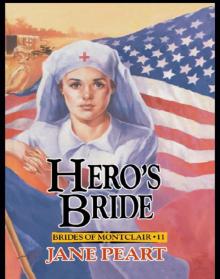 Hero's Bride
Hero's Bride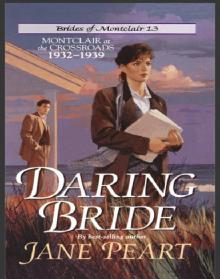 Daring Bride
Daring Bride Runaway Heart
Runaway Heart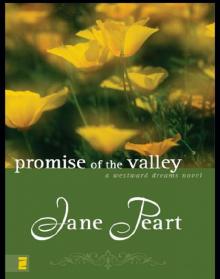 Promise of the Valley
Promise of the Valley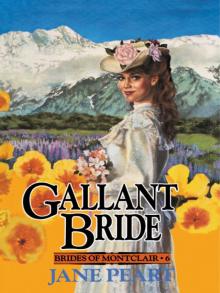 Gallant Bride
Gallant Bride The Pledge, Value
The Pledge, Value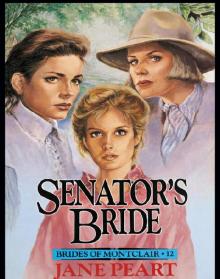 Senator's Bride
Senator's Bride Valiant Bride
Valiant Bride Shadow Bride
Shadow Bride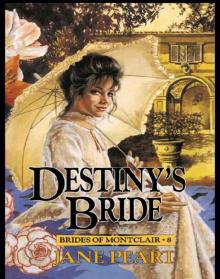 Destiny's Bride
Destiny's Bride A Tangled Web
A Tangled Web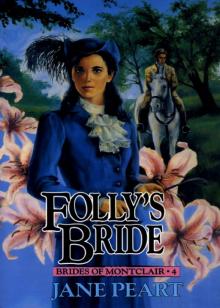 Folly's Bride
Folly's Bride The Promise
The Promise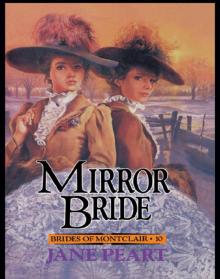 Mirror Bride
Mirror Bride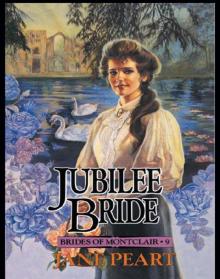 Jubilee Bride
Jubilee Bride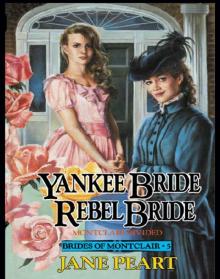 Yankee Bride / Rebel Bride
Yankee Bride / Rebel Bride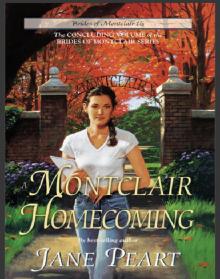 A Montclair Homecoming
A Montclair Homecoming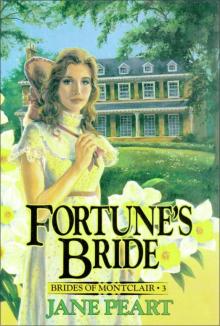 Fortune's Bride
Fortune's Bride Undaunted Spirit
Undaunted Spirit Love Takes Flight
Love Takes Flight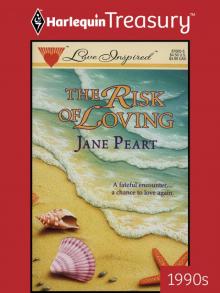 The Risk of Loving
The Risk of Loving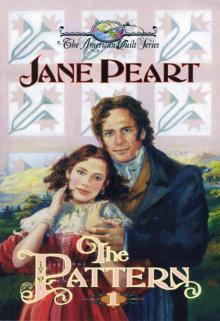 The Pattern
The Pattern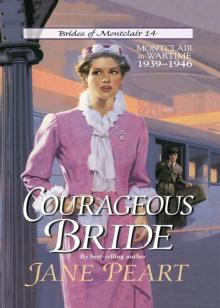 Courageous Bride
Courageous Bride